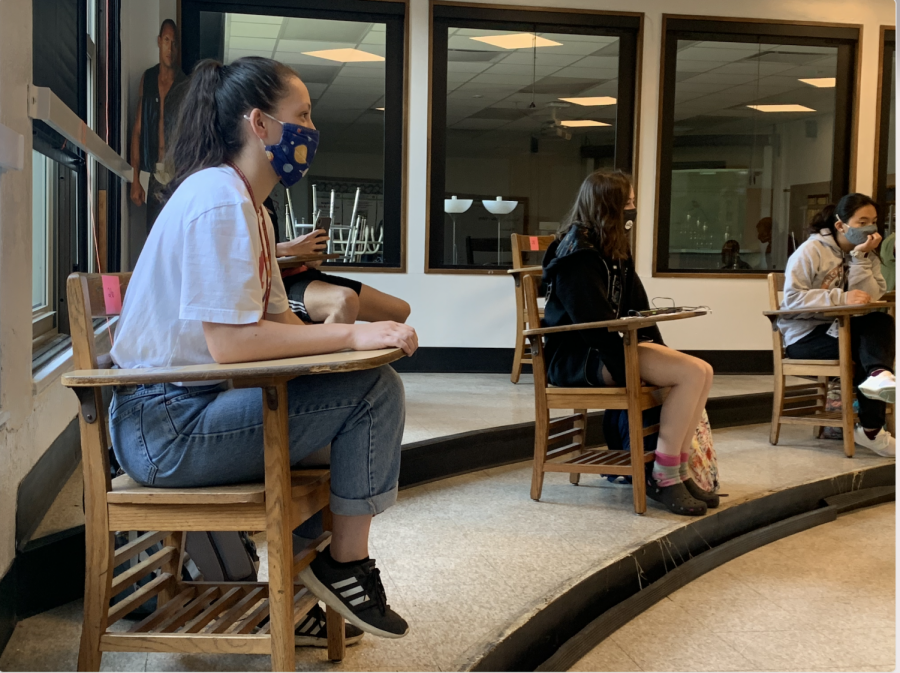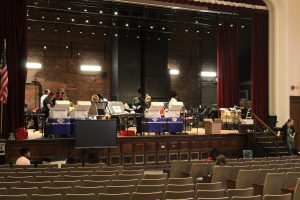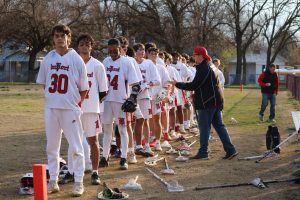Management of in-person learning: What makes it difficult now?
Leah Greenberg (11, YPAS) sits down for her second block class, advanced physics with Mr. Applegate. Photo by KC Ciresi.
October 25, 2021
A sense of normalcy is what many students hoped for during dark times of the pandemic. Quickly we transitioned from a five-day school week into virtual meetings with colored bubbles of initials replacing the faces of our classmates. Though we have returned in-person on a consistent schedule, with the accommodations for COVID-19, many students believe the shift has been overwhelming.
Being virtual many after-school programs resumed online as well. NTI left more time for students to take on extra shifts at work, extend practices in specializations like sports, music, and more. Being in-person causes students to lose the time between classes NTI allowed. Students now have to adjust to being in-person without the extra time at home.
To analyze the impact the return in person has had on Manual students, a survey was conducted on Instagram for Manual students to give feedback.
Between the two major transitions students faced, the return of full-time in-person school and NTI, 64 percent of students surveyed found the transition in-person to have more difficulty than the transition to NTI. There was no correlation between grade levels of the likelihood students feeling less or more prepared for the return in person was shown on the survey. Both upperclassmen and underclassmen alike found the experience to be a required adjustment.
Focusing on the essential issue for students, what makes in-person school so hard? If this was the routine we were all hoping to return to and the structure remains the same does it seem more challenging than before?
Students’ mental health, academic challenges and lack of social interaction were analyzed through this survey.
Out of the three, the most influential factor was the lack of social interactions, especially those specific to each grade level (such as class rings for juniors). From missing the annual celebrations of Red/White Week to each event, over half of the students (58 percent) felt that they were missing out on the whole experience they would grasp in person.
Being in-person is further than the difficulty of balancing academics but extracurriculars and jobs that students are involved in. During NTI and even with half-day weeks, it allowed students to be more flexible with their schedules. However, students are learning how to balance their schedules to ensure they complete necessities like eating and schoolwork on time.
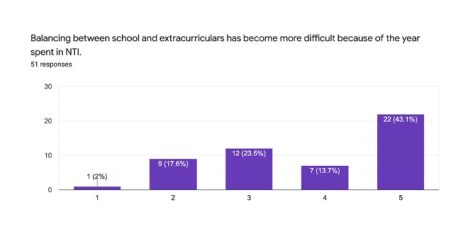
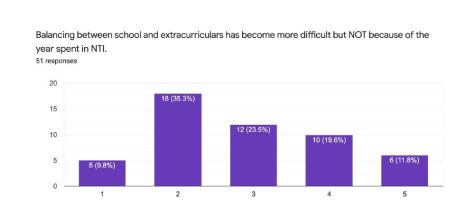
“NTI, I had a lot more time to practice and get things a lot more prepared but now that I’m adding all these different bands and extracurriculars it’s really made it that I have time management,” Christopher Gissendaner (YPAS, 10) said. Gissendaner participates in both the Marching Band and Pit Orchestra.
Academic challenges were also another influential factor impacting the experience of NTI with a little over half (51 percent) of students that made the experience in person significantly harder, tying with the ability to manage a routine during NTI (51 percent).
The struggle for students continues through mandated quarantine for all students that test positive or come in contact with someone who has tested positive for COVID-19. Many students reported feeling disconnected from their classmates after returning to school. During their time in quarantine, the rate of students that felt unmotivated to do work was somewhat similar to those feeling able to continue their work from home, which was also related to their perception of how NTI benefited them or not. Students that reported having a more difficult time adjusting to NTI were also the most likely to have higher rates of feeling unmotivated when being quarantined.
Out of the three influential factors impacting students during the transition of returning to in-person learning, mental health was one of the least impacted factors and is still a concern among students at 54.9 percent who agree that NTI negatively impacted their mental health. With the return to in-person learning, the habits that students adapted to in quarantine, both good and bad, need to be reshaped to fit the new setting.
Now that JCPS has made it at least three months into the school year, students feel they have adapted a routine, though the school year seems to be moving too fast to notice. Overall, students are excited to have the experiences that in-person learning offers. Despite the rigor with continuous adjustment, there may be a chance of normalcy.



